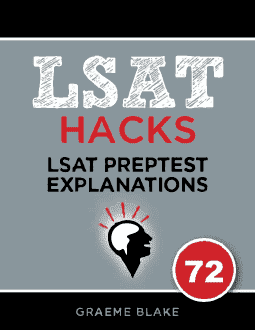QUESTION TEXT: In one study, hospital patients' immune systems…
QUESTION TYPE: Flawed Reasoning
CONCLUSION: Those with a greater tendency to laugh will have faster immune system recovery. Even if they laugh just a little.
REASONING: Those with a greater tendency to laugh had greater immune system recovery after they watched comic videos.
ANALYSIS: This question drowns you in words. The test writers wanted to hide an obvious error: the stimulus doesn’t tell you how much each group laughs!
We know this: two groups watched comic videos. And those who tended to laugh more had better recovery. The evidence does say “this indicates” laughter can help, so we know it’s true.
But the stimulus left out a key detail. How much does each group laugh? The conclusion implies that the group with a greater tendency to laugh didn’t laugh as much. But the evidence didn’t say that!
Maybe those who tend to laugh, laughed more at the comic videos, and this is why they recovered faster.
___________
- CORRECT. Exactly. The evidence never says how much each group laughed at the videos. We would normally expect the group with a greater tendency to laugh to laugh more.
- The stimulus was talking about gains in immune system strength. Starting strength isn’t relevant – we only care how much the immune systems of each group improved.
- Look carefully at the conclusion. It’s not talking about the whole population. It’s just talking about patients in hospitals who need to recover from illness.
- The stimulus said one group had a greater tendency to laugh “to begin with”. So immune system strength gains didn’t cause this difference. It was already there, and the group that had a tendency to laugh saw a more rapid recovery of immune system strength.
- The stimulus is talking about immune system recovery. This helps recover from illness, but the immune system is the main point.


Have to say, this was the hardest question from both the LR sections combined for me. And I got it wrong.
Hi Graeme,
Thank you for all your explanations. They are incredibly helpful, especially for pesky questions like these. I’ve been feeling more and more stumped as I progress through the more recent preptests. It seems like the new tests contain many more questions with tricky trap answers and confusing wording than older PTs did. Do you feel that the LSAT is getting more difficult within the 70s group? Do you find that different skills and topics are being focused on than previously had been?
Thanks for any insight!
There are certainly some changes. I can’t say whether they’re harder or not. It may be more likely you’re used to the older style and need some exposure to the new ones to adjust. But I really don’t know – only LSAC has the data to say whether the tests are objectively harder.
Sir,
Just reviewing PT 72 and for this question I had some thoughts on your explanation. The conclusion attributes the faster recovery to the TENDENCY to laugh, instead of the laughter itself. The argument ignores the possibility that the greater TENDENCY leads to more laughter, but it is really the laughter that is expediting recoveries.
Thus, it would not follow that those with a greater TENDENCY to laugh would recover faster if they laughed less than those without the TENDENCY. I found this to be a pretty tough question for question 7.
v/r,
Dave
The argument overlooks the possibility that the TENDENCY is irrelevant, and all that matters is the laughter.
Yup, that’s the central error: the argument mixed up laughing and the tendency to laugh. Classic LSAT flaw: implying that two different things are the same.